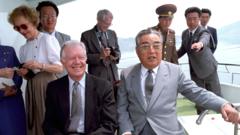In June 1994, tensions between the United States and North Korea reached a boiling point, with fears of an impending nuclear war looming large. It was during this critical moment that former US President Jimmy Carter intervened, embarking on a groundbreaking visit to North Korea that would have profound implications for peace on the Korean Peninsula.
Carter’s visit was the first by a former or sitting US president to North Korea, a nation struggling with rising suspicions about its nuclear program. US intelligence had detected signs that North Korea was secretly developing nuclear weapons, heightened by their announcement of withdrawing fuel rods from the Yongbyon reactor, violating an agreement that required IAEA inspections. As Washington grappled with potential military responses, including the threat of strikes against North Korea’s nuclear facilities, Carter stepped in as an unorthodox mediator.
In an act of unshakeable determination, Carter accepted an invitation from North Korean leader Kim Il-sung, despite having been critical of him due to his experiences in the Korean War. Shortly after hearing of the US military's planned measures, he sought to bridge diplomacy between both nations, even as the US government expressed reluctance to support his initiative.
Carter flew to Pyongyang, alongside his wife Rosalynn and a small group of aides, meeting with Kim and engaging in discussions that spanned several days. The former president quickly realized that North Korea felt cornered by the threat of a US military action, and he successfully facilitated an environment for negotiations, pushing for demands from Washington while also making concessions of his own.
Ultimately, through robust negotiations, Carter helped forge a deal wherein North Korea would freeze its nuclear activities in exchange for US support in building civilian nuclear reactors, a plan that led to a temporary cooling of tensions. However, despite the initial success, the agreement faced backlash from various US officials, who accused Carter of sidelining the administration's policies.
Carter's audacious actions not only momentarily curtailed the prospect of war but also paved the way for future diplomatic interactions between North Korea and the US, sparking a more extensive discourse on nuclear disarmament. His approach and determination ultimately opened doors for later dialogues, including summits involving subsequent US presidents. Although the initial deal eventually broke down, Carter's intervention is remembered as a significant moment of constructive diplomacy that changed the course of history.
Carter's legacy, shaped by his bravery and commitment to dialogue amid swirling criticism, resonates through ongoing efforts to resolve tensions between the US and North Korea, and he is remembered as a key figure in shaping the narrative around diplomacy in conflict resolution. In a world still grappling with nuclear threats from North Korea, Carter's resolute decision to meet and negotiate serves as a reminder of the power of engagement over warfare.
Carter’s visit was the first by a former or sitting US president to North Korea, a nation struggling with rising suspicions about its nuclear program. US intelligence had detected signs that North Korea was secretly developing nuclear weapons, heightened by their announcement of withdrawing fuel rods from the Yongbyon reactor, violating an agreement that required IAEA inspections. As Washington grappled with potential military responses, including the threat of strikes against North Korea’s nuclear facilities, Carter stepped in as an unorthodox mediator.
In an act of unshakeable determination, Carter accepted an invitation from North Korean leader Kim Il-sung, despite having been critical of him due to his experiences in the Korean War. Shortly after hearing of the US military's planned measures, he sought to bridge diplomacy between both nations, even as the US government expressed reluctance to support his initiative.
Carter flew to Pyongyang, alongside his wife Rosalynn and a small group of aides, meeting with Kim and engaging in discussions that spanned several days. The former president quickly realized that North Korea felt cornered by the threat of a US military action, and he successfully facilitated an environment for negotiations, pushing for demands from Washington while also making concessions of his own.
Ultimately, through robust negotiations, Carter helped forge a deal wherein North Korea would freeze its nuclear activities in exchange for US support in building civilian nuclear reactors, a plan that led to a temporary cooling of tensions. However, despite the initial success, the agreement faced backlash from various US officials, who accused Carter of sidelining the administration's policies.
Carter's audacious actions not only momentarily curtailed the prospect of war but also paved the way for future diplomatic interactions between North Korea and the US, sparking a more extensive discourse on nuclear disarmament. His approach and determination ultimately opened doors for later dialogues, including summits involving subsequent US presidents. Although the initial deal eventually broke down, Carter's intervention is remembered as a significant moment of constructive diplomacy that changed the course of history.
Carter's legacy, shaped by his bravery and commitment to dialogue amid swirling criticism, resonates through ongoing efforts to resolve tensions between the US and North Korea, and he is remembered as a key figure in shaping the narrative around diplomacy in conflict resolution. In a world still grappling with nuclear threats from North Korea, Carter's resolute decision to meet and negotiate serves as a reminder of the power of engagement over warfare.






















